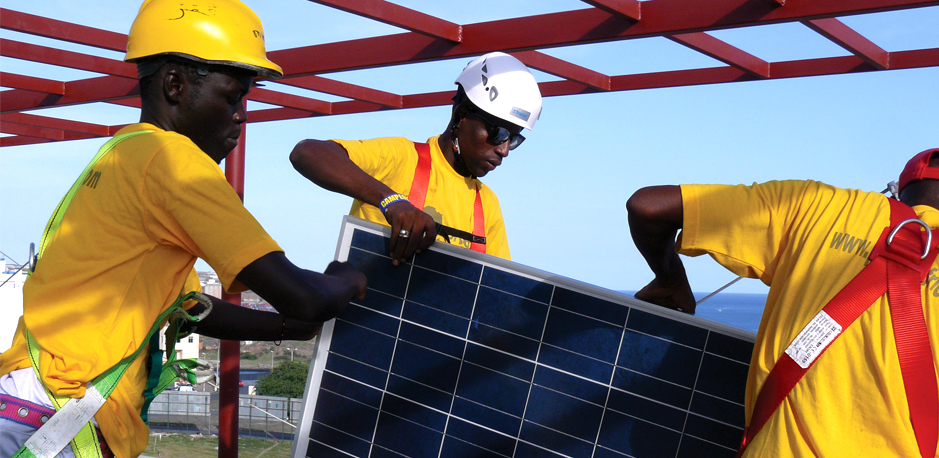Sustainable Energy Solutions Program in West Africa

The ECOWAS Centre for Renewable Energy and Energy Efficiency (ECREEE), the United Nations Industrial Development Organization (UNIDO) in cooperation with the Columbia University’s School of Engineering and Applied Science (SEAS) in New York and the Engineering Department of the University of Cape Verde (UNICV) in Mindelo, Sao Vicente, have executed an innovative certified distant-learning fellowship for building capacities of West African experts in the field of sustainable energy systems and solutions.
Fellowship students
The first round of the program includes nine (9) West African experts currently employed by utilities, regulators or independent power producers (IPPs) in the areas of renewable energy technologies, energy efficiency and energy policy planning. The overall objective is to strengthen the long-term capabilities of these institutions and companies to design and appraise projects, integrate renewable energy and energy efficiency into their planning, operational and monitoring cycles and contribute to strengthening of policy framework at the national level. Recent studies and reports by various organizations including ECREEE and UNIDO have revealed that lack of capacity, knowledge and awareness on the technical feasibility and economics of renewable energy and energy efficiency technologies and systems is still a major barrier for scaling up clean technologies and investments in the electricity sector of countries of West Africa.
Project type: Sustainable Energy
Location:
New York City
West Africa
Partners:
ECOWAS Centre for Renewable Energy and Energy Efficiency (ECREEE)
United Nations Industrial Development Organization (UNIDO)
Engineering Department of the University of Cape Verde
Links:
Program Site
Menu:
Fellowship Students
Structure of Course
Curriculum
International and Regional Context
Papers
Related Blog Entries
Structure of Course
The certificate program includes e-learning lessons by Vijay Modi, lead of SEL, as well as other faculty members of Columbia University. In addition to a physical workshop to be held at the Engineering Department of the University of Cape Verde (UNICV) in Mindelo, Sao Vicente. Written exams for each course take place in the form of tests, home works and MATLAB assignments in line with standards and procedures applied by the concerned School of the Columbia University. The program ends with a final exam. The courses are held exclusively in English.
Successful students will receive a Columbia University’s Certificate of Professional Achievement in Sustainable Energy. The Certificate will constitute four 3-credit courses. The students will be expected to successfully complete the 12 credit curriculum with a minimum average GPA achieved of 3.0.
Curriculum
The specific topics to be covered range from energy sources, energy conversion technologies, and energy infrastructure planning to applications and implementation as they pertain to different energy services. System level issues about integration of renewable energy and incorporating energy efficiency will be addressed. The program will offer a broad overview of possible renewable energy and energy efficiency technologies and their unique characteristics. The curriculum will train students in quantitative tools that assist in decision-making when multiple technological choices that have varying spatial and temporal capabilities/impacts are present. Technologies that rely on a combination of renewable and storage and combination of power with heat/cooling (cogeneration) are critical to capture in the curriculum. For a global curriculum, ability to plan with local resources, temporal variability of the resource and the appropriate centralization/decentralized level of the infrastructure is also important. Students will also develop the capacity to design and assess bankable projects that connect demand to supply.
The program will include the following modules:
- Introduction to the general energy and particularly the renewable energy and energy efficiency. Special context setting for the Economic Community of West African States (special module executed by ECREEE, UNIDO)
- Introduction on Energy: units, nomenclature, energy sources, energy carriers, and services
- Historical perspective and relationship to economic growth,
- Decarbonization, renewable energy and energy efficiency
- Energy sources and conversion
- Renewable sources of heat: geothermal and biomass, biomass derived energy carriers: biogas, plant biofuels, lipids, DME. Role in Cooking/heating/access, energy-food-water nexus.
- Conversion Devices: Internal Combustion Engines, Stirling Engines,
- Solar Energy – Specialized coverage on Solar thermal engineering because of it’s relevance to West Africa and the Sahel. Photovoltaics, concentrated solar thermal, concentrated PV,
- Wind Power, turbomachines, gas turbines, small hydro, pumped hydro
- Systems approach to energy: efficient energy use, combined heat and power
- Integration of RES into the energy system
- Energy Infrastructure Planning with computer assisted system planning tools (Perspectives on the ECOWAS region, project work based on data availability)
- Demand Forecasting and demand growth
- Energy Policy Tools and Regulatory Framework
International and Regional Context
The certificate program on Sustainable Energy Solutions is directed towards the three objectives of the Sustainable Energy for All Initiative (SE4ALL): (1) ensuring universal access to modern energy services; (2) doubling the share of renewable energy in the global energy mix, and (3) doubling the global rate of improvement in energy efficiency. Energy issues facing society are seen as one of the biggest technological and policy challenge of the century.


